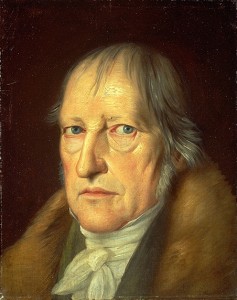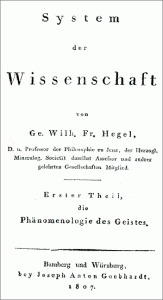Hegel is to philosophy what the economist Joseph Schumpeter was to the concept of capitalism. He embodies the historical inexorability of what the latter termed “creative destruction.”
Very few philosophers, let alone theologians, who still after all these years of abuse continue to sport the name tag “pomo”, understand that if it were not for Hegel, they would never have had a calling. Increasingly historical research and genealogical perspectives on the rise of French “poststructuralism” – rebaptized as “postmodernism” by Jean-Francois Lyotard in the 1980s – demonstrate the the likes of Derrida, Deleuze, and even the young Badiou were merely offsc ourings of the kind of French Hegelianism fomented through the seminars of Alexandre Kojeve and the translations of Jean Hypolite.
ourings of the kind of French Hegelianism fomented through the seminars of Alexandre Kojeve and the translations of Jean Hypolite.
Hegel was, and in a certain sense still is, the enduring Oedipal figure for the French post-structuralists. Deleuze and Guattari’s Anti-Oedipus, first published in 1972, can also be read as a kind of anti-Hegelian screed, aiming to short-circuit the dialectic and drive the subject back from the demand of Absolute Spirit that it “go over into its opposite” (i.e., the Freudian renunciation of infantile desire) into the (maternal) orgiastics of pure becoming.
One could also argue that Derrida’s project of deconstruction, born of his early wrestling with the quest for Husserlian “certainty” and Hegel’s theory of truth throughout the 1960s and early 1970, belongs to the very same genre. Read what Derrida in “Hegelian Semiology” (1971) calls “presence” as “father,” metaphysics as superego, etc.
But an anti-Oedipal Hegel can also be discerned transparently in the formation as well as the itinerary of post-structuralism.
For example, a revival of Derrida’s youthful efforts during the Sixties to reposition French structuralism – and hence the unshakable legacy in French thought of Cartesian formalism and deductive rationalism – as a semiotics of force, which derived directly from the opening chapters of The Phenomenology of Spirit, can be found in his book from the late Eighties entitled Of Spirit. The book is ostensibly about Heidegger, but it is really about Hegel, and even more importantly about envisioning Hegel as one who himself envisions thought in ways we are not used to, or even comfortable with, envisioning.
Derrida’s later preoccupation with the religion of the “impossible” and the politics of the “undeconstructible” are obvious outcomes of his own, unspoken “Hegelian moment” when all of a sudden philosophy is no longer simply about signs and texts, reading and writing, but about the self-dissolution of finite intellectual calculations and the stilling of the rage for determinacy in a submission of the task of thinking to what he terms the “gift of death”. The gift of death is Abraham’s le don, the strange summons he receives from the unknown God who has fulfilled his long-standing promise and blessed him with a son to “give up” that very gift.
How is that Hegelian?
For Derrida, Abraham’s sacrifice is what he, citing the Czech philosopher Jan Patočka, considers the “secret of European responsibility.” But this secret of responsibility consists in the self-sacrifice of the determinate European subject, the Cartesian “thinking thing” – the res cogitans – which makes both epistemological, theological, or moral reflection in every sense possible.
Hegel laid the groundwork for this insight in his second preface to the Science of Logic, composed at Berlin in 1831.
If “freedom” in both its political and intellectual meaning is to become real, we must let go of what Hegel in the preface dubs our “instinctive act” of thinking, our exercise of the categoreal structures by which we formulate propositions and frame judgments. “When the content of the interest in which one is absorbed is drawn out of its immediate unity with itself and becomes an independent object of one’s thinking,” Hegel writes, “then it is that spirit begins to be free.”
In other words, only when the subject as an immediate, compact zone of smug self-referentiality with all its “habits” of cognition is compelled to surrender what seems the most obvious epistemological starting point so that “truth” may not only manifest, but flourish, does thinking truly become viable.
For Hegel, therefore, every Aufhebung is at the same time an Aufgabe, a “task,” an “abandoning,” or a “mission” (as the German language with its predilection for pol ysemic or portmanteau words suggests). But the outreaching of the an sich of subjective thought into the realm of the für sich of the mind’s own self-sacrificial freedom to think itself as not-self as well as self-and-not-self-and-more both marks and instantiates the “infinite responsibility” which Derrida identifies as the key to both the religious and the postmodern.
ysemic or portmanteau words suggests). But the outreaching of the an sich of subjective thought into the realm of the für sich of the mind’s own self-sacrificial freedom to think itself as not-self as well as self-and-not-self-and-more both marks and instantiates the “infinite responsibility” which Derrida identifies as the key to both the religious and the postmodern.
If “logic” is not ultimately about language, propositions, inferences, and conclusions – the so-called protocols of “veridiction”, as Foucault terms it – but about the realization of truth as the “Whole,” then the implication is unmistakable. Philosophy must become noesis, or a kind of visionary “mindedness” in the Greek sense. But it is an infinite mindedness, one way I believe we can genuinely translate Hegel’s master term Begriff, conventionally and uninspiredly often rendered as “Notion.”
If Derrida 1.0 up until the 1980s can be considered as the enfant terrible of post-structuralism, offering an updated critical “Kantianism” that was armed with twentieth-century linguistic theory and employed Saussure’s peculiar take on the difference between spoken (parole) and written (écriture) expression rather than Humean skepticism to demolish the theory of “presences” (i.e., Kant’s “things in themselves”), Derrida 2.0 from the late 1980s onward distills for our age the vast potentiality of Hegelian thought, captured perhaps in his slogan from his post-9/11 work Rogues: “saving the honor of reason.”
Such an honorable rationality is an infinite, expansive reason, one that no longer has to genuflect before the regime of the Kantian “understanding” (Verstehen) with its operative, but unchanging “conditions” for the synthesis of all knowledge while circumscribing not only empirical science, but religion, ethics, and even the esthetic “within the limits of [finite] reason alone.” It is a rationality that is not “irrational,” but hyperrational, rationality on Red Bull, what Derrida earlier earmarks as a “new Enlightenment.”
We can of course discern comparable soundings of any emergent “new perspectives on Hegel” in the work of Alain Badiou.
Badiou’s Logics of Worlds, the second volume what he himself considered his central and constitutive work, takes to the next level the tacit implications of Hegel’s Logic itself. In Logics of Worlds, what I myself would consider his most important book, Badiou maps out what he terms a “greater logic” that drives philosophy in the direction of Hegelian Wissenschaft – the German word normally translated as “science” but also has more of a connotation of the Latin scientia, or the Greek sophia (i.e., “wisdom”).
Badiou sees himself as aiming to “wrest logic away from the constraint of language, propositions, and predication, which is merely a derivative envelope” of such a “logic of worlds.” In the book Badiou even goes so far as to identify his logic with a “phenomenology,” the same move that Hegel makes in the first preface to Science of Logic (1812) right after having published the Phenomenology of Spirit.
One could say, however, that Badiou’s “phenomenology” comes down to the grand contextualization of what is always most problematic for philosophy and theology alike, the “given” or the “apparent”. Postmodern thought has in some measure amounted to what Derrida refers to as the “apparition of the inapparent”. But that is in itself the enduring Hegelian theme – how to bring that which merely “seems to be”, or even what seems “unseemly”, into a certain play of logos where universality and concreteness coalesce, where the “real is rational and the rational is real.”
But, as Badiou points, out, the difference lies in how we render discursivel this so-called “concrete universal” as the site of a genuine, immanent rationality, as God “thinking himself” through human thought – so to speak – in the bare historical moment, yet at the same time in the truly “speculative” sense of the infinite actualizing itself within the finite.
Badiou notes: “we share with Hegel a conviction about the identity of being and thought. But for us this identity is not a local occurrence and not a totalized result. We also share with Hegel the conviction regarding a universality of the True. But for us this universality is guaranteed by the singularity of truth-events, and not by the view that the Whole is the history of an immanent reflection.”
For Badiou, the situation of transformation for the multiple particularities of historical self-conscious is what he understands as the determinative “truth-event”, which no longer allows any greater synthesis or “negation of the negation” (Aufhebung). A singularity occurs within the space of thought, interpretation, and action that requires the instant and radical remapping of all trajectories of argument and inference hitherto.
We can start to get a grip on what Badiou is saying here by considering the different ways in which Badiou and Hegel characterize philosophically the origin of Christianity. For Hegel, Christ’s crucifixion and resurrection becomes the fulcrum not only for salvation history, but for Western thought as a whole.
The Christian confession consists in a sort of “master signifier” for all conceptual dialectic, and hence for the odyssey of Western philosophy overall. As Luther pointed out, God “died” on the Cross, but not once and for all. If thought is the Good Friday of Western subjectivity, the Hegelian Notion is the Easter Morning of philosophy as a whole, which finally realizes its “godlike” vision and ramifications.
Badiou wants neither to fashion a theology, or a theodicy, out of the Resurrection. What counts for him is Paul’s own “revelation” (the Greek word in Ephesians is apokalypsis) on the road to Damascus.
This “truth-event” not only becomes the “singular” moment for the founding of Western “universalism”, Badiou insists in his well-known book on Paul, but for a radical, emancipatory praxis. The subsequent “truth procedures” (in Badiou’s parlance) emanating from this truth event are obviously “Christian” in their historical genesis. Yet for Badiou they compasses something much, much larger – the re-activation of the Western project of freedom, which Hegel himself saw as inextricable from the very undertaking of philosophy and theology.
If we still consider ourselves as “postmodernists” in any meaningful sense – and that is a recurrent challenge we all face, given the absolute mindless intellectual debauchery to wh ich the construct has been subjected in recent decades – we must reclaim our Hegelian roots.
ich the construct has been subjected in recent decades – we must reclaim our Hegelian roots.
These roots grow deep, and they are genuinely “rhizomic”, inasmuch as they intertwine with so many other conceptual pathways we currently converse. But we cannot go forward until we examine them more closely.
We are not at the “end of history”, as many of Hegel’s followers once misread him.
But we are at the end of our habitus of misreading of Hegel perhaps, the Hegel who the Oedipal insurrectionists of a previous generation wanted to dissolve trimuphally into a panlogism of desire without reason, or reason without desire (as we find in the new “speculative realists”, who very much strike me as burned out and brain-fried erstwhile Deleuzians).
We have attained the new Hegelian moment, and the view is breathtaking!
Carl Raschke is Professor of Religious Studies at the University of Denver and senior editor of the Journal for Cultural Theory. He has published numerous books on contemporary philosophy, culture, and theological thought, including most recently GloboChrist (Baker Academic, 2008), Postmodernism and the Revolution in Religious Theory (University of Virginia Press, 2012, Critical Theology: A Primer (IVP Academic, 2015), and Force of God: Political Theology and the Crisis of Liberal Democracy (forthcoming). He is also co-founder of the Global Art & Ideas Nexus as well as one of the faculty for the Global Center for Advanced Studies. More information as well as videos of lectures and talks can be found at http://www.carlraschke.com.